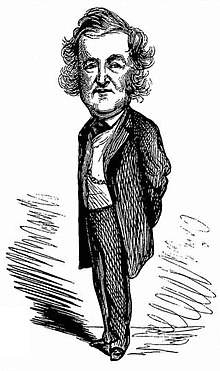
Box and Cox is a one act farce by John Maddison Morton. It is based on a French one-act vaudeville, Frisette, which had been produced in Paris in 1846.
Box and Cox was first produced at the Lyceum Theatre, London, on 1 November 1847, billed as a "romance of real life." The play became popular and was revived frequently through the end of the nineteenth century, with occasional productions in the twentieth century. It spawned two sequels by other authors, and was adapted as a one-act comic opera in 1866 by the dramatist F. C. Burnand and the composer Arthur Sullivan, Cox and Box, which also became popular and continues to be performed regularly. Other musical adaptations were made, but have not remained in the repertory.
The phrase "Box and Cox" has entered the English language: the Oxford English Dictionary defines it as "applied allusively to an arrangement in which two persons take turns in sustaining a part, occupying a position, or the like."